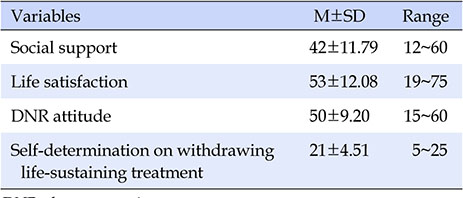1Graduate School, Department of Nursing, Sahmyook University, Seoul, Korea.
2Shinnae Senior Welfare Center, Seoul, Korea.
3Department of Nursing, Sahmyook University, Seoul, Korea.
© 2016 Korean Society of Adult Nursing
This is an open access article distributed under the terms of the Creative Commons Attribution Non-Commercial License (http://creativecommons.org/licenses/by-nc/3.0/), which permits unrestricted non-commercial use, distribution, and reproduction in any medium, provided the original work is properly cited.


DNR=do not resuscitate.
DNR=do not resuscitate.
DNR=do not resuscitate.
DNR=do not resuscitate.
DNR=do not resuscitate.
DNR=do not resuscitate.
DNR=do not resuscitate.
DNR=do not resuscitate.